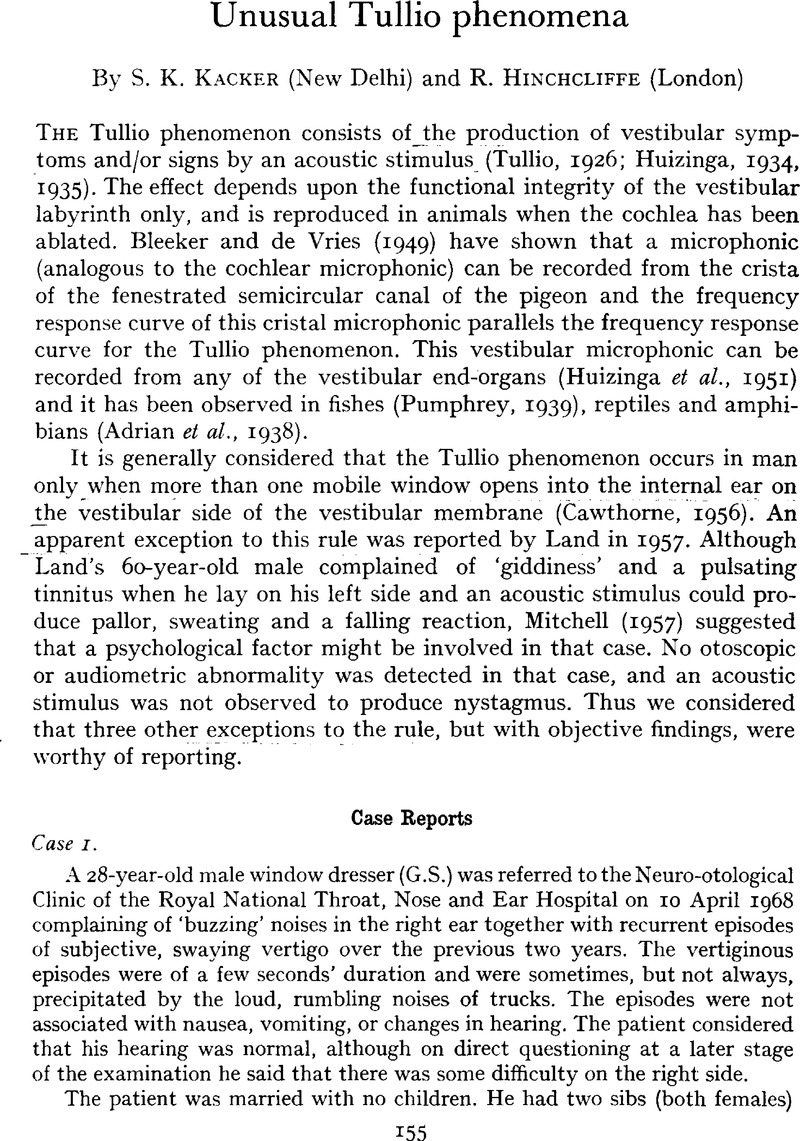Crossref Citations
This article has been cited by the following publications. This list is generated based on data provided by Crossref.
Stephens, S. D. G.
and
Ballam, H. M.
1974.
The sono-ocular test.
The Journal of Laryngology & Otology,
Vol. 88,
Issue. 11,
p.
1049.
Erlich, Mark A.
and
Lawson, William
1980.
The Incidence and Significance of the Tullio Phenomenon in Man.
Otolaryngology–Head and Neck Surgery,
Vol. 88,
Issue. 5,
p.
630.
Deecke, L.
Mergner, T.
and
Plester, D.
1981.
TULLIO PHENOMENON WITH TORSION OF THE EYES AND SUBJECTIVE TILT OF THE VISUAL SURROUND.
Annals of the New York Academy of Sciences,
Vol. 374,
Issue. 1,
p.
650.
Oosterveld, W. J.
Polman, A. R.
and
Schoonheyt, J.
1982.
Vestibular Implications of Noise-Induced Hearing Loss.
British Journal of Audiology,
Vol. 16,
Issue. 4,
p.
227.
Walford, R.E.
1983.
A Classification of Environmental “Hums” and Low Frequency Tinnitus.
Journal of Low Frequency Noise, Vibration and Active Control,
Vol. 2,
Issue. 2,
p.
60.
Britton, B. Hill
1986.
Vestibular Responses to Pressure Variations: A Review.
Otolaryngology–Head and Neck Surgery,
Vol. 95,
Issue. 4,
p.
516.
Vogel, P.
Tackmann, W.
and
Schmidt, F.-J.
1986.
Observations on the Tullio phenomenon.
Journal of Neurology,
Vol. 233,
Issue. 3,
p.
136.
Ishizaki, Hisayoshi
Aalto, Heikki
Pyykkö, Ilmari
and
Starck, Jukka
1991.
Tullio Phenomenon and Postural Stability: Experimental Study in Normal Subjects and Patients with Vertigo.
Annals of Otology, Rhinology & Laryngology,
Vol. 100,
Issue. 12,
p.
976.
Ishizaki, Hisayoshi
Pyykko, Ilmari
Aalto, Heikki
and
Starck, Jukka
1991.
The Tullio Phenomenon in Patients with Meniere's Disease as Revealed with Posturography.
Acta Oto-Laryngologica,
Vol. 111,
Issue. sup481,
p.
593.
Brandt, Thomas
1991.
Vertigo: Its Multisensory Syndromes.
p.
57.
Colebatch, J G
Rothwell, J C
Bronstein, A
and
Ludman, H
1994.
Click-evoked vestibular activation in the Tullio phenomenon..
Journal of Neurology, Neurosurgery & Psychiatry,
Vol. 57,
Issue. 12,
p.
1538.
Marchbanks, R. J.
1996.
Intracranial and Intralabyrinthine Fluids.
p.
51.
Brandt, Thomas
1999.
Vertigo.
p.
99.
Watson, Shaun R. D.
Halmagyi, G. Michael
and
Colebatch, James G.
2000.
Vestibular hypersensitivity to sound (Tullio phenomenon).
Neurology,
Vol. 54,
Issue. 3,
p.
722.
Ostrowski, Vincent B.
Byskosh, Arkadush
and
Hain, Timothy C.
2001.
Tullio Phenomenon With Dehiscence of the Superior Semicircular Canal.
Otology & Neurotology,
Vol. 22,
Issue. 1,
p.
61.
Streubel, Phillip D. Cremer, John P, Sven-Olrik
2001.
Vestibular-Evoked Myogenic Potentials in the Diagnosis of Superior Canal Dehiscence Syndrome.
Acta Oto-Laryngologica,
Vol. 121,
Issue. 545,
p.
41.
Goto, Fumiyuki
Ogawa, Kaoru
Kunihiro, Takanobu
Kurashima, Kazuhiro
Kobayashi, Hironari
and
Kanzaki, Jin
2001.
Perilymph fistula — 45 case analysis.
Auris Nasus Larynx,
Vol. 28,
Issue. 1,
p.
29.
Brandt, Thomas
2003.
Vertigo.
p.
99.
Belden, Clifford J.
Weg, Noah
Minor, Lloyd B.
and
Zinreich, S. James
2003.
CT Evaluation of Bone Dehiscence of the Superior Semicircular Canal as a Cause of Sound- and/or Pressure-induced Vertigo.
Radiology,
Vol. 226,
Issue. 2,
p.
337.
Chevalier, E.
Courtat, P.
Parvy, F.
and
Peytral, C.
2005.
Séquelles otologiques des traumatismes craniocervicaux.
EMC - Oto-rhino-laryngologie,
Vol. 2,
Issue. 4,
p.
365.



